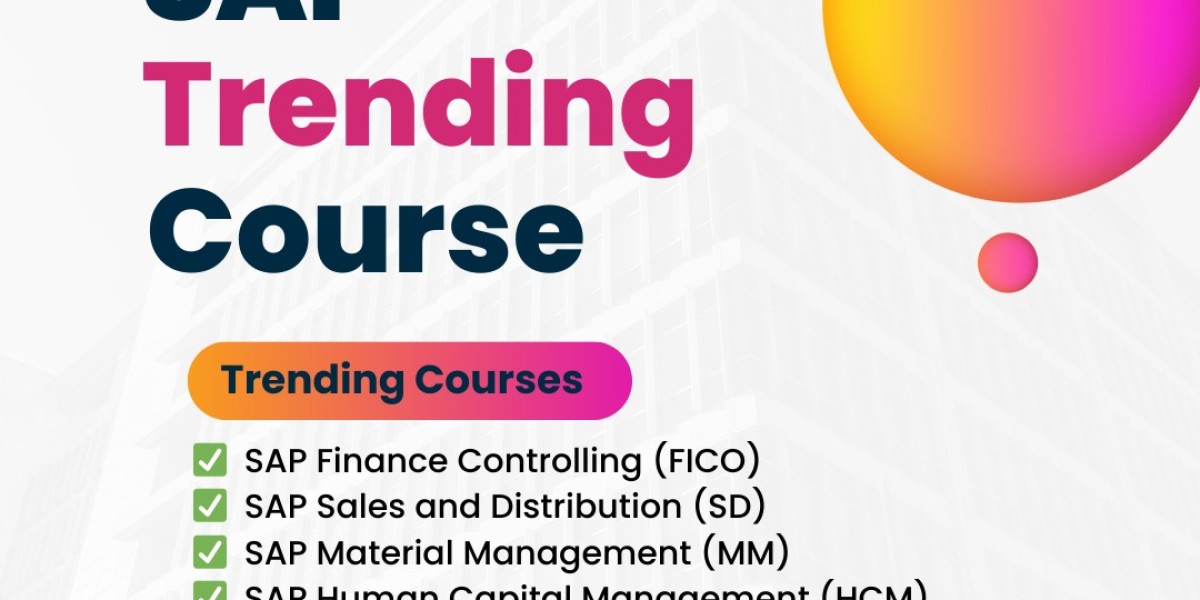The SAP Financial Accounting and Controlling (FICO) module is one of the most sought-after certifications in the SAP ecosystem, equipping professionals with the skills necessary to manage financial processes effectively within organizations. Whether you’re looking to upskill in financial management or start a career as an SAP consultant, understanding SAP FICO course details can help you make informed decisions about this pivotal career step. The SAP FICO course focuses on two main components: Financial Accounting (FI) and Controlling (CO). These modules work together to help businesses maintain accurate financial records, improve planning, and control business processes. This blog explores the SAP FICO course details, benefits, and how the course can shape your career in finance and enterprise resource planning.
What is Covered in SAP FICO Course Details?
The SAP FICO course provides a structured approach to understanding financial transactions and controlling costs within an organization. The course is divided into two main modules:
- SAP FI (Financial Accounting): This module focuses on financial reporting and accounting processes, including managing assets, tracking revenues, and producing balance sheets.
- SAP CO (Controlling): The Controlling module helps in planning, tracking, and managing costs, enabling businesses to improve efficiency and profitability.
Together, these modules provide an integrated approach to managing financial data, making SAP FICO a valuable asset for finance professionals.
Key Modules and Topics in SAP FICO Course
The SAP FICO course details cover a wide range of topics designed to prepare candidates for real-world challenges. Some core topics included in the SAP FICO course are:
- General Ledger Accounting (GL): Understanding the foundation of financial accounting with ledger entries.
- Accounts Payable and Receivable (AP/AR): Mastering management of vendor and customer transactions.
- Asset Accounting: Learning to manage assets, their acquisition, and depreciation.
- Cost Element Accounting: Capturing and tracking costs within the organization.
- Internal Orders: Organizing and tracking internal projects or events.
- Profit Center and Cost Center Accounting: Managing and analyzing data to understand profitability and cost distribution.
The depth and breadth of these topics make SAP FICO ideal for financial analysts, accountants, and professionals aiming to enhance their expertise in financial management.
Benefits of Understanding SAP FICO Course Details
Grasping the SAP FICO course details provides significant advantages for those looking to pursue a career in finance and accounting. This module allows professionals to build robust financial skills, make strategic decisions, and improve overall financial transparency within organizations.
1. High Demand for Certified SAP FICO Professionals
As businesses increasingly rely on data-driven decision-making, the demand for SAP FICO professionals continues to rise. SAP FICO certification signals expertise in finance and accounting, making certified individuals highly competitive in the job market. Employers value SAP FICO-certified professionals for their ability to manage complex financial data, streamline processes, and ensure compliance with accounting standards.
2. Enhanced Career Opportunities and Salary Potential
SAP FICO certification opens doors to diverse career paths in finance, accounting, and consulting. Common roles include SAP FICO Consultant, Financial Analyst, and Accounts Manager. These roles often come with attractive salary packages due to the specialized nature of the skills acquired. This benefit justifies the investment in understanding SAP FICO course details and highlights the long-term career benefits of certification.
3. Valuable Skills for Cross-Functional Teams
SAP FICO training provides essential skills that are useful not only in finance departments but also for cross-functional teams. With a comprehensive understanding of SAP FICO course details, professionals can work effectively with teams involved in project management, HR, and production planning. The integration between different SAP modules allows FICO professionals to contribute strategically across the organization.
SAP FICO Course Prerequisites and Eligibility
While a finance or accounting background is beneficial, SAP FICO courses are designed to be accessible for anyone with an interest in financial management. Understanding basic accounting principles can help, but most institutes offer foundational modules to cover necessary prerequisites.
Eligibility typically varies based on the institution, but the course is suited for:
- Finance professionals seeking ERP specialization
- Accountants interested in systems integration
- Recent graduates aiming to start a career in SAP consulting
- IT professionals looking to expand their expertise in financial systems
SAP FICO vs. Other SAP Modules: How Do They Compare?
When considering SAP certification, it’s helpful to understand how SAP FICO differs from other modules, such as SAP SD or MM. SAP SD Courses focus on sales and distribution processes, including managing orders, billing, and shipping, whereas SAP FICO emphasizes finance and cost control. For those interested in managing the financial aspects of an organization, SAP FICO is ideal; however, if a candidate’s interest lies in logistics or sales, then SAP SD or MM might be more suitable.
Understanding these differences helps candidates choose the module that aligns best with their career goals and increases the relevance of their SAP certification.
Course Duration, Format, and SAP FICO Course Fees
The duration and format of SAP FICO courses can vary significantly depending on the institute. While some programs offer intensive boot camps lasting a few weeks, others may provide part-time options that extend over several months.
- Course Duration: Most SAP FICO courses range from 4 to 10 weeks, depending on the level of detail covered and the candidate’s experience. Institutes may offer weekday or weekend classes, allowing working professionals to balance learning with their careers.
- Learning Format: SAP FICO courses are available both online and in-person, with online classes providing flexibility and convenience for remote learners. Some institutes offer hybrid options, combining self-paced modules with live, instructor-led sessions.
The cost of SAP FICO courses can vary depending on the training provider, course duration, and certification exam fees. While online courses are generally more affordable, in-person courses might incur additional expenses related to infrastructure and learning materials.
Making the Most of SAP FICO Training
To derive maximum benefit from an SAP FICO course, candidates should approach their training with a structured plan. Here are a few tips to make the most out of SAP FICO training:
- Engage Actively in Practical Exercises: SAP FICO training includes practical exercises that simulate real-world scenarios. Engaging in these exercises helps to reinforce theoretical knowledge and build practical skills.
- Network with Peers and Instructors: Interacting with instructors and fellow learners can open up networking opportunities and provide insights into best practices and common challenges.
- Review Course Materials Regularly: Regularly revisiting course materials and notes enhances retention, allowing candidates to approach the certification exam with confidence.
Certification Exam and Its Career Impact
After completing an SAP FICO course, candidates are eligible to sit for the certification exam. This exam assesses the knowledge gained during training and is recognized globally as a standard of expertise in SAP FICO.
SAP FICO certification demonstrates a professional’s commitment to excellence and helps distinguish them in the job market. With this certification, professionals can increase their career prospects and access higher-paying roles within organizations of all sizes. Mastering SAP FICO course details and obtaining certification can help candidates progress toward rewarding careers in SAP consulting, financial management, and ERP implementation.
Conclusion: The Importance of SAP FICO Training for Career Advancement
The decision to pursue SAP FICO training can significantly impact an individual’s career trajectory. For finance and accounting professionals, SAP FICO course details provide an in-depth understanding of financial and controlling processes, equipping them with skills that are increasingly valued across industries.
By understanding SAP FICO and its integration with other SAP modules, professionals can gain a holistic view of financial operations within an organization. This knowledge not only increases job opportunities but also strengthens a candidate's ability to make strategic contributions. With SAP FICO training, individuals are better positioned for leadership roles in finance, ensuring they remain competitive in the evolving job market.









